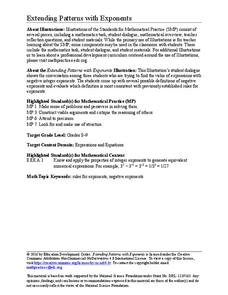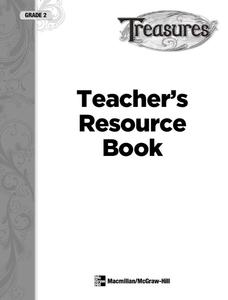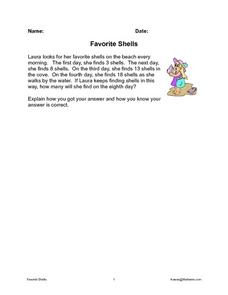Curated OER
Make Your Own Quilt
In this quilt patterns learning exercise, 2nd graders analyze the pattern in two rows of 12 shapes. Students continue the pattern in the empty grid to complete the quilt design.
Curated OER
Bicycles & Tricycles
In this bicycles and tricycles worksheet, learners solve and complete 8 different problems that include counting the number of bicycles and tricycles in each store. First, they complete the table for the number of wheels on the bikes in...
Curated OER
Pascal's Bats
In this number patterns activity, students look for patterns in the bats to help them write the numbers that would be on the 6th row of bats. Students write 2 different patterns they find.
Illustrative Mathematics
Kitchen Floor Tiles
An interesting way to look at the kitchen floor is to count the number of tiles in the border. Fred starts with four white floor tiles and writes an expression for the number of tiles needed for the colored border. Algebra learners are...
EngageNY
When Can We Reverse a Transformation? 1
Wait, let's start over — teach your class how to return to the beginning. The first instructional activity looking at inverse matrices introduces the concept of being able to undo a matrix transformation. Learners work with matrices with...
Kiz Club
Rhyme Time: -at
Get rhyming with this cute printable! The teacher puts together these little sliders that look like worms, and kids move the worm to see matching words and images. All of the words end with -at.
K12 Reader
Feel the Green Grass
This poem may make your learners yearn for summer, but it will also help them practice the ee digraph. Pupils read the short poem, which includes many examples of the ee digraph, and respond to three reading comprehension questions.
PBS
Math with Jake: Frequencies and Pitch
Be an octave above the rest. A musician explains how to write music in different time signatures. An interesting resource continues to demonstrate ratios using the pitch of musical notes and hertz. Pupils use a pitch table and determine...
Curated OER
Complete the Patterns
In this patterns worksheet, learners look at the each of the patterns in the 5 rows of shapes. In each row, students recognize patterns by filling in the last 2 shapes to complete the pattern in each of the 5 rows.
Curated OER
Function Tables
In this function tables worksheet, students analyze the number patterns in each of 2 tables. Students determine the patterns and fill in the blanks in the table.
Education Development Center
Extending Patterns with Exponents
Don't think negatively about exponents. Young mathematicians dissect a fictional conversation between pupils trying to evaluate an expression with a negative exponent. This allows them to understand the meaning of negative exponents.
EngageNY
When Can We Reverse a Transformation? 2
The second lesson on finding inverse matrices asks class members to look for a pattern in the inverse matrix and test it to see if it works for all matrices. The teacher leads a discussion to refine the process in finding inverses, then...
Education Development Center
Integer Combinations—Postage Stamps Problem (MS Version)
Number patterns can seem mysterious. Help your learners unravel these mysteries as they complete an intriguing task. Through examination, collaborative groups determine that they are able to produce all integers above a certain value by...
Mathematics Assessment Project
“Ponzi” Pyramid Schemes
Use mathematics to show your classes the power of a good model. Young mathematicians analyze the famous Ponzi pyramid scheme using an exponential pattern. They make conclusions on the reliability of the plan and why it is illegal.
Kelly's Kindergarten
May Daily Activities
Five weeks of daily activities for the month of May! With a new activity for each day of the month, your youngsters will utilize a variety of skills and practice everything from sight words and spelling to counting by twos or coloring...
McGraw Hill
Phonics Teachers Resource Book
Looking to improve your classes literacy program? Then look no further. This comprehensive collection of resources includes worksheets and activities covering everything from r-controlled vowels and consonant digraphs, to the different...
Curated OER
Patterns
In this patterns learning exercise, 2nd graders look at, study, analyze and choose which pattern comes next in 5 rows of patterns. Students circle and draw their answers.
Curated OER
Completing Patterns
In this pattern worksheet, students tell which shape should come last in a patterned row, 4 rows total. A reference web site is given for additional activities.
Curated OER
Multiplication Patterns
In this multiplication patterns learning exercise, students complete a set of 8 questions, using multiplication patterns, comparing digits to find patterns and using patterns to make predictions. Answers included on page 2.
Curated OER
Boxes of Patterns- Following the Rule in Addition and Subtraction Patterns
In this addition and subtraction pattern enrichment worksheet, 2nd graders follow the given rule to fill in the pattern boxes. They examine the patterns as they add and subtract with two digit numbers, and write a sentence telling what...
Curated OER
Number Operations for Grade 1
In this number operations for grade 1 worksheet, 1st graders answer 15 multiple choice questions in a standardized test format about primary number operations.
Curated OER
Shape Patterns
In this math worksheet, students examine a pattern of geometric shapes. After looking at the sequence of shapes and deciding what the pattern is, students choose the shape that would come next. There are 4 problems.
Curated OER
Total English Advanced: What is the Verb Pattern?
In this verb patterns worksheet, students practice their grammar skills as they complete 10 sentences by selecting the appropriate verbs to finish them. Students also write 6 original sentences using the verbs in the word bank.
Curated OER
Finding Patterns: Favorite Shells
In this pattern math learning exercise, students read a word problem and determine the pattern in order to solve the problem correctly. Students then write about how they got their answer and how they know it is correct.

























